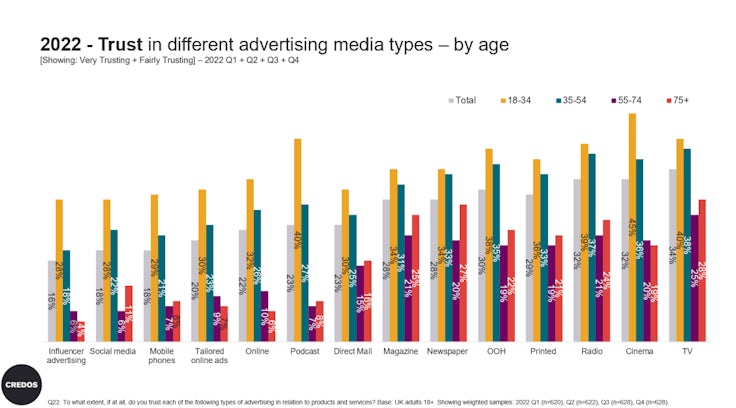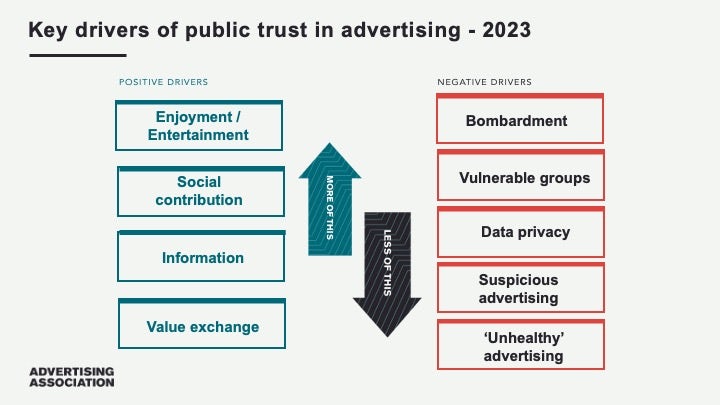Report reveals generational divide in trust around advertising
The gap between generational attitudes to advertising is widening, as differences in the media to which people are exposed growing up emerge.
 A new report has unveiled the extent of the generational differences around trust in advertising. While there are universal concerns, changes in the media with which different generations are socialised is leading to that growing divide.
A new report has unveiled the extent of the generational differences around trust in advertising. While there are universal concerns, changes in the media with which different generations are socialised is leading to that growing divide.
According to research from Credos – a UK industry thinktank dedicated to advertising – and research agency Craft, consumers between the ages of 35 and 54 are far more concerned with data privacy than younger and older audiences. “Older people were socialised in a more static media landscape, younger people have grown up in a world supplemented by ever-changing web-based media,” according to the report’s authors.
It goes on to argue that “younger people are certainly more aware and informed about how their data is being used but do not necessarily feel any more in control of the situation, though it bothers them less than people in that middle age group”. They also note that older people (55+) tend to be least concerned regarding their data simply because they are less present on the relevant media and therefore have less need to understand the issue.
Trust in advertising industry ‘boosted by ASA campaign’Crucially for brands seeking to reach new audiences, even younger people do accept that not all advertising will be relevant to them. As Credos also points out, while there are varying degrees of knowledge about how data is gathered and processed, consumers across all demographics seem to be increasingly willing to accept a degree of irrelevance to guard their privacy
Beyond those generational differences, audiences in general still cite bombardment of advertising as a core cause for mistrust. Younger audiences in particular are more concerned about this issue than ever before, with the proportion of people citing it as the main cause rising from under a fifth (19%) to just under a third (32%) between the 2021 research and this latest study.
Konrad Callao, founder of Craft, said: “This research brings into stark relief how attitudes to advertising are shaped by a person’s wider worldview on matters such as privacy, sustainability, consumption, to name but a few – understanding an individual’s wider attitudes and beliefs on these issues seems to be a critical part of understanding their attitudes to and trust in advertising.
“Increasingly we are seeing a divide between what kinds of advertising the youngest and oldest adults are exposed to, and therefore what they enjoy, tolerate and are concerned by.”

The researchers do note that there are actions the industry can take to stem the ongoing trust crisis around advertising. It advocates for further education relating to the role of regulators like the Advertising Standards Authority (ASA), which would counteract the perception that it is a wild west in which false claims remain unchallenged.
Stephen Woodford is chief executive of the Advertising Association, which hosted the LEAD event at which the results of the research were unveiled this morning. He explained that the ASA’s advertising campaign promoting its own activities can continue to play a key role in challenging that perception: “The ASA advertising campaign results show that relevant action can make a difference, with those aware of the ASA’s comprehensive regulation of advertising content via this campaign having a 50% higher level of trust than those unaware of it”.
The research also highlights other means by which advertisers can contribute to mending public perceptions of advertising. Creativity and consumer enjoyment of advertising are far and away the biggest reasons for trust in advertising. While the Credos report does not examine whether individual brand uplift occurs as a result, the organisation does note that: “the core findings from the research would suggest that ATL campaigns are more likely to be trusted but that’s not to say that BTL campaigns with innovative creative or a little humour wouldn’t do the same”.
The ability of entertainment in advertising to engender trust has long been seen as a core strength of the medium. The Works, a project by the Advertising Association in collaboration with Kantar and Marketing Week, aims to highlight that core strength. Creativity has been shown to act as a differentiator for brands, but additionally entertainment can deliver uplift to advertising as a whole.
Advertising’s social contribution was the second most significant driver of trust with an importance score of 10% according to the research.

The fact that bombardment remains of critical importance for consumers suggests that, while progress is being made in some areas to fix consumer concerns round advertising, there is a long way to go yet. The challenge for the UK marketing industry is that the global nature of digital advertising means that change must come holistically from the overall advertising industry, rather than being something the UK can fix on its own.








Comments